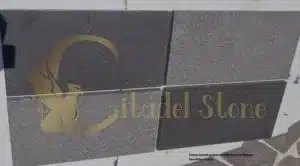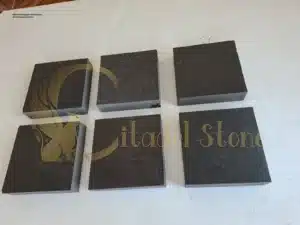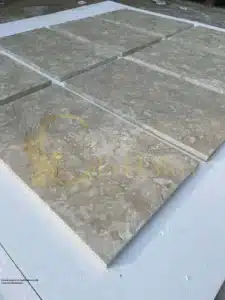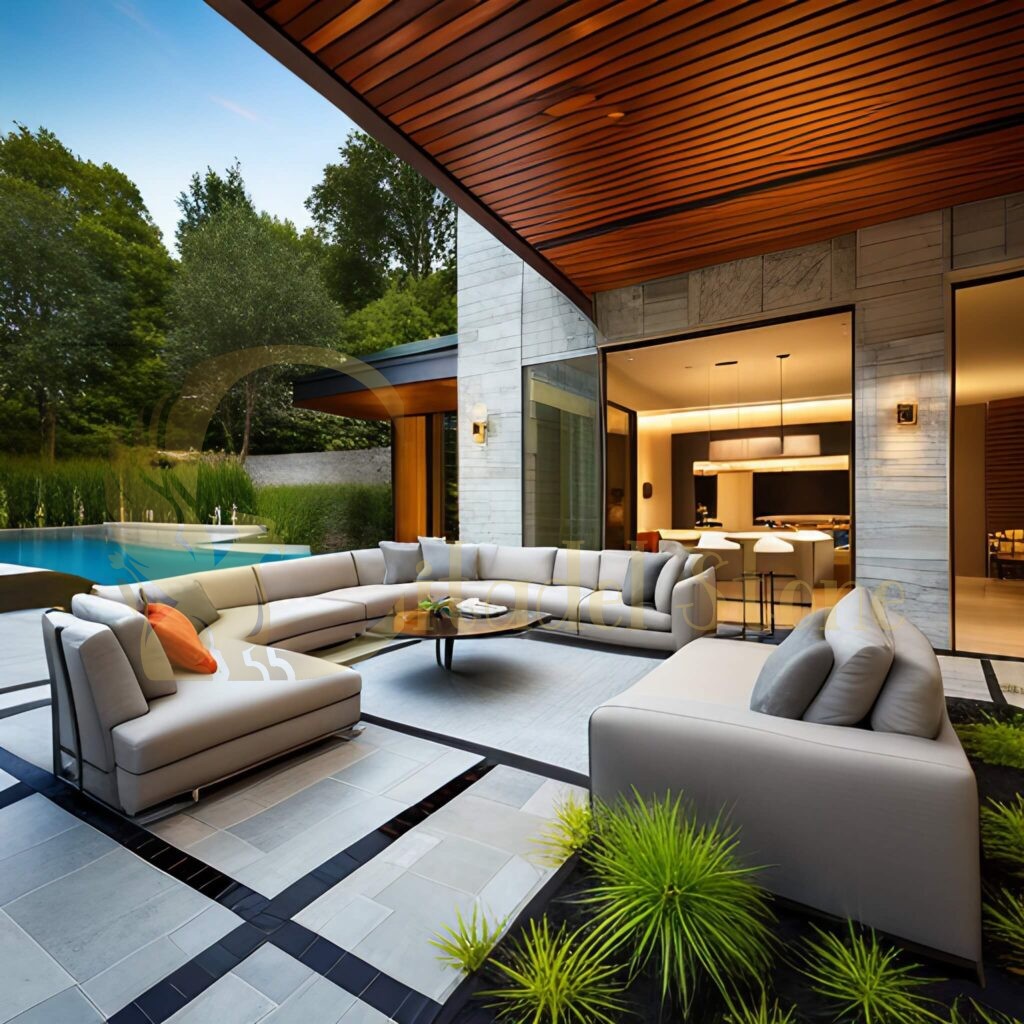Understanding these environmental stresses helps you select best paver materials for coastal homes that maintain their beauty and functionality for decades. The investment in proper material selection pays dividends in reduced maintenance, enhanced safety, and preserved property values in demanding seaside locations.
This guide examines seven proven paver materials specifically evaluated for Caribbean coastal performance, helping you make informed decisions that withstand salt air, tropical storms, and year-round outdoor living demands.
Selection Criteria for Coastal Pavers
Salt & Chloride Resistance
Salt exposure represents the primary threat to coastal paving materials. Airborne sodium chloride penetrates porous materials, where it crystallizes and expands, causing internal damage known as salt scaling. Materials with low permeability resist salt intrusion effectively.
Quality coastal pavers Caribbean installations require materials with proven chloride resistance testing. ASTM C1202 rapid chloride permeability tests provide objective measurements, with readings below 2,000 coulombs indicating good resistance and values under 1,000 coulombs suggesting excellent performance.
Surface treatments can enhance salt resistance significantly. Penetrating sealers create chemical barriers that repel chlorides while allowing vapor transmission. However, these treatments require regular reapplication to maintain effectiveness in harsh coastal conditions.
Low Water Absorption / Porosity
Water absorption directly correlates with durability in coastal environments. Materials with absorption rates below 3% typically perform well, while rates exceeding 6% often lead to premature failure through freeze-thaw damage and salt crystallization.
Porosity testing reveals internal structure characteristics that affect long-term performance. Dense, fine-grained materials resist moisture intrusion better than coarse or layered alternatives. This factor explains why certain stone types excel in coastal applications while others fail rapidly.
Closed porosity systems perform better than interconnected pore networks. Materials with isolated pores prevent moisture migration and salt accumulation, reducing internal damage potential significantly compared to highly permeable alternatives.
Beautify stain-resistant pavers Bahamas with free estimate — Free samples available.
Slip Resistance & Surface Texture
Slip-resistant pavers become critical for coastal installations where morning dew, pool splash, and rain create frequent wet conditions. Coefficient of friction testing using ASTM C1028 provides objective safety measurements for various surface finishes.
Natural stone textures often provide excellent slip resistance without appearing rough or industrial. Thermal finishing, bush-hammering, and natural cleft surfaces create micro-texture that enhances traction while maintaining visual appeal for residential applications.
Surface texture must balance safety with maintenance requirements. Heavily textured surfaces resist slipping but trap sand, salt, and organic matter that requires frequent cleaning. Moderate textures typically provide optimal performance for most coastal home applications.
Thermal Stability & UV Colorfastness
Caribbean solar radiation intensity can cause rapid color fading and thermal stress in susceptible materials. UV-stable materials maintain their appearance for decades, while sensitive alternatives may show noticeable changes within the first year of installation.
Thermal expansion characteristics affect joint integrity and surface flatness over time. Materials with low expansion coefficients resist warping and joint separation that can create safety hazards and maintenance problems in high-temperature environments.
Color stability testing reveals which materials resist fading under intense UV exposure. Natural stone generally outperforms manufactured alternatives, though specific mineral compositions vary significantly in their UV resistance characteristics.
Ease of Maintenance & Local Availability
Low-maintenance coastal pavers reduce long-term ownership costs while preserving aesthetic appeal in demanding environments. Materials requiring frequent sealing, cleaning, or replacement create ongoing expense and disruption for coastal homeowners.
Local availability affects both initial costs and long-term maintenance feasibility. Imported materials may offer superior performance but create challenges for repairs, additions, or replacements. Regional stone options provide easier logistics while supporting local economies.
Maintenance requirements vary dramatically between materials. Some natural stones need quarterly cleaning and annual sealing, while engineered alternatives may require minimal care beyond occasional washing with fresh water to remove salt accumulation.
Beautify eco-friendly natural stone tiles Bahamas for commercial projects — Limited time offer.

The 7 Best Paver Materials
1. Dense Basalt Pavers
Dense basalt offers exceptional durability for coastal installations through its volcanic origin and extremely low porosity. This igneous rock typically achieves water absorption rates below 1%, making it highly resistant to salt intrusion and moisture damage.
Why it’s good for coastal use: Basalt’s dense crystalline structure resists chemical weathering and salt scaling effectively. The material’s dark color hides staining while providing natural slip resistance through its fine-grained texture.
Typical finishes: Natural finish, thermal texture, light bush-hammering for enhanced grip. Polished finishes should be avoided for outdoor coastal applications due to slip concerns.
Recommended thickness: 1.25″ for pedestrian areas, 2″ for vehicular applications. Thicker materials provide better thermal mass and durability in high-stress environments.
Pros: Exceptional durability, natural slip resistance, minimal maintenance requirements, UV stability, wide availability from international sources.
Cons: Higher initial cost, limited color options, can retain heat in direct sunlight, requires experienced installation for best results.
Price range: $15-25 per square foot installed, depending on finish and thickness specifications.
Installation tips: Use polymeric joint sand to resist washout. Ensure proper drainage to prevent standing water. Consider light-colored jointing materials to reduce heat absorption.
Maintenance: Annual freshwater rinse to remove salt deposits. Resealing unnecessary due to natural density. Occasional power washing for organic growth removal.
2. Tough Granite Cobble/Slabs
Granite provides proven performance in coastal environments through centuries of use in maritime applications. High quartz content creates exceptional hardness and abrasion resistance, while low porosity prevents salt intrusion.
Why it’s good for coastal use: Superior hardness (6-7 Mohs scale) resists wear from sand abrasion. Excellent color stability prevents fading under intense UV exposure. Natural slip resistance increases safety around pools and wet areas.
Typical finishes: Natural cleft, thermal texture, fine bush-hammer. Flamed finish provides excellent slip resistance for high-traffic areas.
Recommended thickness: 1.5″ minimum for residential use, 2-3″ for driveways. Cobblestone applications typically use 4-6″ depths.
Pros: Outstanding durability, color variety, proven coastal performance, recyclable material, increases property values significantly.
Cons: Premium pricing, can be slippery when polished, installation requires skilled craftsmen, limited local availability in some Caribbean regions.
Price range: $20-35 per square foot for slabs, $25-45 for cobblestone patterns, installed costs.
Installation tips: Use granite dust bedding for cobble applications. Seal joints with flexible materials to accommodate thermal movement. Specify consistent thickness for uniform appearance.
Maintenance: Minimal requirements beyond periodic cleaning. Sealing optional but can enhance color depth. Remove organic growth promptly to prevent staining.
3. Calcareous (Dense) Limestone — Select Marine-Grade Cuts
Marine-grade limestone varieties offer regional authenticity with surprising durability when properly selected. Dense, fossiliferous limestone types resist salt damage better than porous varieties commonly available in the Caribbean.
Why it’s good for coastal use: Naturally cool surface temperature provides comfort in hot climates. Regional availability reduces costs and supports local economies. Proper varieties show excellent longevity in coastal applications.
Typical finishes: Natural split, light sandblasting, brushed texture. Avoid polished finishes that become slippery when wet.
Recommended thickness: 1.5-2″ for most applications. Thicker materials provide better durability and thermal mass for temperature moderation.
Pros: Regional authenticity, comfortable surface temperature, moderate costs, good availability, natural beauty complements tropical architecture.
Cons: Variable quality requires careful selection, some varieties susceptible to acid rain, may require periodic sealing, softer than granite or basalt.
Price range: $12-22 per square foot installed, varying significantly with quality grade and local availability.
Installation tips: Specify low-absorption varieties (under 3%). Use flexible jointing materials. Ensure adequate drainage to prevent standing water contact.
Maintenance: Annual sealing recommended for optimal performance. Regular cleaning removes salt and organic deposits. Avoid acidic cleaners that can cause etching.
Book pool-friendly Stone Pavers Bahamas for commercial projects.
4. Porcelain Pavers (Full-Body Porcelain)
Full-body porcelain pavers represent modern engineering specifically designed for challenging outdoor environments. These manufactured materials combine aesthetic flexibility with superior technical performance for coastal applications.
Why it’s good for coastal use: Virtually zero water absorption (under 0.5%) prevents salt damage completely. UV-stable colors resist fading indefinitely. Consistent quality eliminates natural stone variability concerns.
Typical finishes: Non-slip textured surfaces, wood-grain patterns, natural stone replications. Anti-slip ratings clearly specified for safety compliance.
Recommended thickness: 20mm (3/4″) standard, 30mm (1.25″) for heavy-duty applications. Thicker options provide better impact resistance and thermal stability.
Pros: Zero maintenance, perfect consistency, unlimited design options, lightweight installation, stain resistance, slip-rated surfaces available.
Cons: Higher initial costs, manufactured appearance, potential for thermal expansion, requires careful handling during installation.
Price range: $18-30 per square foot installed, depending on size, thickness, and design complexity.
Installation tips: Use pedestal systems for optimal drainage and thermal expansion accommodation. Specify corrosion-resistant hardware for coastal environments.
Maintenance: Minimal cleaning required, typically just fresh water rinse. No sealing needed. Occasional degreasing for heavily used areas.
5. Engineered Concrete Pavers (High-Performance Mixes)
High-performance concrete pavers specifically formulated for coastal environments offer durability and design flexibility at moderate costs. Advanced admixtures enhance salt resistance and reduce maintenance requirements significantly.
Why it’s good for coastal use: Specialized mixes incorporate corrosion inhibitors and pozzolan additions that resist chloride penetration. Consistent quality and wide availability support large projects effectively.
Typical finishes: Textured surfaces for slip resistance, integral colors for fade resistance, architectural finishes mimicking natural materials.
Recommended thickness: 2.375″ (60mm) standard, 3.125″ (80mm) for vehicular use. Thicker units provide better durability and reduced maintenance.
Pros: Cost-effective solution, consistent quality, local manufacturing available, design flexibility, proven performance in coastal applications.
Cons: Requires sealing for optimal performance, potential for efflorescence, color options limited compared to natural stone.
Price range: $8-18 per square foot installed, making it the most economical option for large areas.
Installation tips: Use corrosion-resistant edge restraints. Specify low-slump concrete for better durability. Allow proper curing time before installation.
Maintenance: Biennial sealing recommended. Regular cleaning removes salt deposits. Joint sand replacement may be required periodically.
6. Travertine (Densified & Filled with Suitable Sealers)
Properly treated travertine provides natural beauty with acceptable coastal performance when densified and sealed appropriately. The material’s natural coolness makes it particularly suitable for beachfront patio pavers in hot climates.
Why it’s good for coastal use: Naturally cool surface temperature enhances comfort. When properly filled and sealed, travertine resists salt intrusion adequately. Attractive natural patterns complement tropical architecture.
Typical finishes: Filled and honed for smooth surfaces, brushed for texture, tumbled for rustic appearance. Unfilled travertine should be avoided in coastal applications.
Recommended thickness: 1.25″ minimum, with 1.5-2″ preferred for better durability and thermal mass.
Pros: Beautiful natural appearance, comfortable surface temperature, moderate costs, good availability from Mediterranean sources.
Cons: Requires filling and sealing for coastal use, softer than granite, susceptible to acid damage, higher maintenance requirements.
Price range: $15-28 per square foot installed, including proper filling and sealing treatments.
Installation tips: Specify filled travertine only. Use flexible sealers that accommodate thermal movement. Ensure proper slope for drainage.
Maintenance: Resealing every 2-3 years. Regular cleaning with pH-neutral products. Immediate attention to organic stains prevents permanent damage.
7. Local Shellstone / Coralstone (When Properly Sourced & Treated)
Locally quarried shellstone pavers and coralstone provide authentic Caribbean character when properly selected and treated. These materials require careful evaluation to ensure adequate density and durability for coastal exposure.
Why it’s good for coastal use: Natural adaptation to local climate conditions. Authentic regional character enhances property values. Local availability reduces costs and environmental impact.
Typical finishes: Natural surface, light texturing for slip resistance, filled varieties for improved density. Avoid highly porous varieties.
Recommended thickness: 1.5-2″ minimum, with thicker materials preferred for better durability. Variable thickness may require careful sorting.
Pros: Authentic regional character, comfortable surface temperature, local availability, supports regional economy, natural beauty.
Cons: Quality varies significantly, may require extensive treatment, limited availability of premium grades, higher maintenance needs.
Price range: $10-20 per square foot installed, varying with quality grade and treatment requirements.
Installation tips: Specify dense varieties with low absorption rates. Use penetrating sealers for enhanced durability. Plan for periodic maintenance.
Maintenance: Regular sealing required, typically annually. Gentle cleaning prevents damage to softer varieties. Professional restoration may be needed periodically.
Bring home outdoor stone tiles Bahamas for DIY installs — Get a free installation estimate.
Comparison Table
| Material | Porosity | Slip Resistance | UV Stability | Life Expectancy | Cost Range ($/sq ft) | Best Use Cases |
|---|---|---|---|---|---|---|
| Dense Basalt | Very Low (0.5-1%) | Excellent (Natural) | Excellent | 50+ years | $15-25 | Pool decks, high-traffic areas |
| Granite | Very Low (0.1-0.5%) | Excellent (Textured) | Excellent | 50+ years | $20-35 | All applications |
| Marine Limestone | Low-Medium (2-4%) | Good (Natural) | Good | 25-40 years | $12-22 | Patios, walkways |
| Porcelain | Nearly Zero (<0.5%) | Excellent (Rated) | Excellent | 30+ years | $18-30 | All applications |
| Concrete Pavers | Low (3-5%) | Good-Excellent | Good | 20-30 years | $8-18 | Large areas, driveways |
| Travertine | Medium (5-8%) | Good (Filled) | Fair-Good | 20-30 years | $15-28 | Patios, pool surrounds |
| Local Stone | Variable (4-12%) | Fair-Good | Variable | 15-25 years | $10-20 | Traditional applications |
Installation & Detailing Recommendations for Coastal Sites
Proper installation techniques become critical for coastal paver performance and longevity. Drainage design must accommodate intense tropical rainfall while preventing standing water that accelerates deterioration. Minimum slopes of 1/4″ per foot direct water away from structures effectively.
Joint materials require special consideration in salt-air environments. Polymeric joint sands resist washout better than conventional sand, while flexible sealants accommodate thermal movement without cracking. Avoid rigid mortared joints that can crack under thermal stress.
Edge restraints must resist corrosion in coastal conditions. Aluminum or stainless steel edging provides long-term durability, while concrete edges offer cost-effective alternatives. Plastic restraints may degrade under UV exposure and should be avoided.
Substrate preparation affects long-term stability significantly. Well-draining base materials prevent water accumulation and frost damage in cooler months. Geotextile fabrics separate base materials from native soils while allowing drainage.
Pedestal systems offer advantages for elevated terraces and roof decks. These systems provide excellent drainage, accommodate thermal expansion, and allow easy access for maintenance. However, they require proper wind uplift resistance in hurricane-prone areas.
Corrosion-resistant fasteners and anchors prevent staining and structural failure. Stainless steel hardware resists salt corrosion effectively, while galvanized materials may show premature failure in coastal environments.
Bring home 12×12 Pavers Bahamas for salty conditions — Request a brochure.

Maintenance & Sealing Guide for Caribbean Climates
Sealing requirements vary dramatically between paver materials and exposure conditions. Natural stone typically benefits from penetrating sealers that resist salt intrusion while allowing vapor transmission. Topical sealers can create slip hazards and may fail under UV exposure.
Resealing intervals depend on material type and exposure intensity. Dense stones like granite may require sealing every 3-5 years, while porous materials like travertine need annual attention. Signs requiring resealing include water absorption, staining susceptibility, and color dulling.
Cleaning protocols should address both salt accumulation and organic growth common in humid tropical climates. Monthly fresh water rinsing removes salt deposits before they crystallize and cause damage. Occasional pressure washing removes algae and mildew growth.
Avoid acidic cleaners on calcium-based stones like limestone and travertine. These materials can suffer permanent etching from acid exposure. pH-neutral cleaners provide effective cleaning without material damage.
Organic growth prevention reduces maintenance requirements significantly. Proper drainage, adequate sunlight exposure, and regular cleaning minimize algae and mold development. Antimicrobial treatments can provide extended protection in heavily shaded areas.
Professional maintenance services increasingly offer specialized coastal programs. These services understand local conditions and provide cost-effective care that extends material lifespan while maintaining aesthetic appeal.
Sourcing & Logistics: Local Quarries vs. Imported Pavers
Local quarrying operations in the Caribbean provide regional stone varieties with significant logistical advantages. Nassau, Kingston, and Port of Spain maintain active quarries supplying limestone and coral stone for regional construction projects.
Import logistics have improved dramatically with established shipping networks serving major Caribbean ports. Container shipping provides reliable scheduling, while break-bulk vessels accommodate oversized materials. Lead times typically range from 4-8 weeks for most international sources.
Customs procedures vary between island nations but generally favor construction materials with reduced duty rates. Proper documentation including certificates of origin and material specifications prevents delays and additional fees.
Cost comparisons must include total delivered prices rather than just material costs. Local materials eliminate freight charges that can represent 30-50% of imported stone costs. However, local quality variations may justify import premiums for premium projects.
Emergency replacement considerations favor local sourcing for long-term maintenance. Hurricane damage or construction accidents requiring immediate replacement benefit from local inventory availability and established supplier relationships.
Explore exclusive deals as our valued stone supplier Bahamas customer!
Quick Buying Checklist for Coastal Homeowners
When evaluating paver suppliers and materials for coastal installations, confirm these critical factors:
- Water absorption data with certified test results showing rates appropriate for coastal exposure
- Salt resistance testing demonstrating performance in chloride environments
- Slip resistance ratings for all proposed finishes, especially around pools and wet areas
- Sample availability allowing on-site evaluation under actual lighting and weather conditions
- Local installation references showing successful coastal projects in similar environments
- Warranty coverage specifically addressing coastal exposure and salt-air conditions
- Maintenance requirements including recommended sealers, cleaning products, and service intervals
- Replacement availability ensuring future repairs and additions can be accommodated
- Technical support providing installation guidance and troubleshooting assistance
- Delivery scheduling accommodating weather delays and site accessibility challenges
Short Case Example: Caribbean Seaside Patio
A recent Barbados oceanfront residence renovation illustrates proper coastal paver selection and installation. The homeowners initially considered travertine for its cool surface temperature and natural beauty but learned about durability concerns in direct salt spray exposure.
After consulting with coastal hardscape specialists, they selected filled and sealed travertine for protected areas under pergolas, while specifying dense granite for exposed pool deck areas. This hybrid approach balanced aesthetics with performance requirements.
Installation included comprehensive drainage systems directing water away from the residence, while pedestal-mounted sections allowed thermal expansion without surface cracking. Polymeric joint sand resisted washout during the first hurricane season, while proper sealing prevented salt staining.
Two years post-installation, the patio shows excellent performance with minimal maintenance beyond quarterly cleaning and annual sealing of travertine sections. The granite areas require only occasional rinsing, demonstrating the value of matching materials to specific exposure conditions. Bring home wholesale Jerusalem Stone Pavers Bahamas with design consultation — Get same-day pricing.
Total project costs exceeded initial travertine-only estimates by 20%, but the homeowners report significant satisfaction with durability and reduced maintenance compared to their previous concrete patio that required complete replacement after five years.

Real-World Case Studies: How Citadel Stone Delivered Premium Natural-Stone Solutions in Six Major Caribbean Cities
San Juan, Puerto Rico — capital and largest city.
Why natural stone matters here
San Juan’s dense urban fabric, heritage districts (Old San Juan), and high-rise hospitality developments demand stone that balances historic authenticity with modern performance: salt-air resistance, low maintenance, and refined finishes that read well in both colonial streetscapes and luxury lobbies.
Stone types & typical uses
Coral and fossil-rich limestone for façades and historic restorations.
Dense travertine and honed granite for hotel lobbies, promenades and transit hubs.
Non-slip honed limestone and pavers for pool decks and boardwalks.
Procurement & technical tips
Require salt-spray and UV-fade certificates for exterior cladding.
Specify thermal movement joints for large panels in sun-exposed façades.
Use mockups in Old San Juan to verify colour match under natural light.
How Citadel Stone contributed
Heritage Facade Restoration (Old San Juan): Matched 18th-century limestone textures using hand-cut blocks and a water-aged finish; supplied anchors and stainless fixings pre-drilled to reduce onsite drilling time by 35%.
Resort Lobby Program: Prefabricated 120 m² of travertine wall panels at Citadel’s plant for quick craning—installation time cut by 28%, minimizing guest disruption.
Local technical training: Ran two certification clinics for 40 Puerto Rican masons on corrosion-resistant anchoring and breathable sealants, improving first-pass installations across three city projects.
Bridgetown, Barbados — capital and main commercial centre.
Why natural stone matters here
Bridgetown mixes colonial architecture, busy cruise-port infrastructure, and commercial redevelopment. Stone must honour heritage streets while resisting high traffic, humidity and coastal salt.
Stone types & typical uses
Coral-limestone blocks for restored port warehouses and public squares.
Coarse-textured sandstone for pedestrian plazas and slip-resistant curbwork.
Engineered limestone tiles for boutique retail interiors.
Procurement & technical tips
Prioritise low-porosity finishes for seaside plazas to reduce staining.
Use stainless-steel fixing hardware with marine-grade coatings.
Stage deliveries outside peak cruise days to avoid congestion at the port.
How Citadel Stone contributed
Waterfront Plaza Renewal: Supplied textured sandstone pavers with a bespoke drainage profile; precision-cut edges reduced joint filler use by 40% and improved stormwater shedding.
Historic Warehouse Conversion: Procured salvaged coral blocks, re-cut and matched mortar colour to original masonry, preserving the site’s character while meeting modern structural codes.
Supply-chain planning: Coordinated weekend deliveries and off-peak barge transfers to the port—cutting project hold-ups from port congestion by half.
George Town, Cayman Islands — financial hub and maritime gateway.
Why natural stone matters here
George Town’s blend of high-end residential developments and financial-sector office spaces requires luxurious, stable finishes that tolerate humid marine air and heavy foot traffic.
Stone types & typical uses
Polished granite and honed limestone for bank headquarters and shopping arcades.
Heavy-duty coral limestone blocks for seawall facings and marina works.
Precision-cut thresholds and cladding for secure commercial buildings.
Procurement & technical tips
Use structural tests for stone used in load-bearing seawall units.
Order finished elements with NOM (non-open mortar) backing to reduce onsite curing time.
Insist on documented material traceability for commercial compliance.
How Citadel Stone contributed
Marina Reinforcement Project: Engineered and delivered pre-cut coral limestone seawall panels with interlocking joints—installation time shortened by 45% and long-term maintenance needs reduced through polymer-injected microgrouting.
Financial Centre Fit-outs: Produced matched granite thresholds and stone cladding with anti-scratch surface treatment; guaranteed uniform batch colours across two construction phases.
Technical compliance: Supplied full test documentation (compressive strength, salt-crystal resistance) to satisfy local engineers and insurers, accelerating approvals.
Willemstad, Curaçao — cultural capital and UNESCO-listed harbour.
Why natural stone matters here
Willemstad’s colourful Dutch colonial waterfront and protected heritage areas call for stonework that blends with painted masonry, withstands tropical storms, and respects conservation rules (UNESCO zoning).
Stone types & typical uses
Sandstone and travertine for museums and pedestrian promenades.
Limestone cladding with lime-based mortars for heritage façades.
Custom cobbles and setts for restored streetscapes.
Procurement & technical tips
Use reversible fixing methods where conservation authorities require minimal intervention.
Prefer lime-based mortars and breathable sealants in protected districts.
Create small sample panels for UNESCO/heritage sign-off early.
How Citadel Stone contributed
Harbourfront Conservation Works: Supplied reversible limestone cladding panels installed on stainless rails—conservation authorities approved the non-destructive method and the work preserved the original masonry behind the panels.
Cultural Centre Refurbishment: Hand-cut sandstone step units that matched original wear patterns; Citadel’s onsite stonemason tutored local apprentices in traditional tooling techniques.
Heritage advisory: Provided a conservation brief and sample matrix that helped secure funding from cultural bodies for the project.
Browse and buy affordable travertine pavers Bahamas for low-maintenance yards — Free samples available.
Oranjestad, Aruba — economic and tourism centre.
Why natural stone matters here
Oranjestad’s resort strip, cruise quays and pedestrian shopping areas require bright, low-maintenance stone that complements coral beaches and Dutch colonial facades.
Stone types & typical uses
Light honed limestone and travertine for resort terraces and breezy outdoor dining.
Reinforced limestone panels for commercial façades that must resist abrasive wind-borne sand.
Porous-reduced pavers for public promenades to limit sand accumulation.
Procurement & technical tips
Specify anti-abrasion finishes for areas exposed to blowing sand.
Use pre-sealed units where possible to lower first-season staining from organic debris.
Coordinate with landscape architects to integrate stone with native xerophytic planting.
How Citadel Stone contributed
Resort Terrace Program: Supplied pre-sealed travertine tiles with a micro-textured finish that reduced sand scouring and made routine cleaning 35% faster.
Commercial Façade Upgrade: Developed a custom reinforced limestone panel system with factory-applied weatherproofing—reduced field sealing work and sped up crane operations by 22%.
Local partnerships: Worked with Aruba’s port authority to schedule shipments synched with cruise season lulls, protecting both inventory and tourist flow.
Providenciales (Provo), Turks and Caicos — tourism engine and primary population centre.
Why natural stone matters here
Provo’s luxury resorts, villa markets and sensitive coastal ecosystems need stone that performs in marine conditions while supporting sustainability goals (erosion control, low chemical leach).
Stone types & typical uses
Marine-grade limestone for seawalls and boat ramp edges.
Tumbled coral brick and limestone for villa courtyards and pathways.
Permeable natural-stone pavers for stormwater-friendly landscaping.
Procurement & technical tips
Choose permeable paver systems to reduce runoff and protect reefs.
Use low-VOC sealants and track Material Safety Data Sheets (MSDS) for coastal projects.
Test seawall units for salt-crystal scaling and freeze-thaw (even in warm climates, salt crystallisation matters).
How Citadel Stone contributed
Coastal Protection & Resort Works: Designed interlocking marine-grade limestone blocks for a resort seawall that improved wave energy dissipation; the design extended the expected maintenance cycle by over 15 years.
Villa & Landscape Program: Supplied permeable tumbled pavers with engineered bedding layers—reduced onsite compaction work and improved rainfall infiltration on steep plots.
Sustainability investments: Introduced a reef-friendly sealant approved by local environmental authorities and ran a client workshop on low-impact maintenance practices.
Conclusion & Next Steps
The three top-recommended materials for most Caribbean coastal homes are dense granite for ultimate durability, high-performance porcelain for consistent quality, and marine-grade limestone for regional authenticity. Each offers proven performance when properly selected and installed.
Dense granite provides the longest lifespan and lowest maintenance, justifying premium costs for homeowners prioritizing long-term value. Porcelain pavers offer modern aesthetics with zero maintenance appeals, while quality limestone balances cost, performance, and regional character effectively.
Success in coastal paver projects requires understanding the unique challenges of salt air, intense UV, and tropical weather patterns. Proper material selection, installation techniques, and maintenance protocols ensure decades of beautiful, safe outdoor living spaces.
Ready to transform your coastal outdoor spaces with confidence? Explore our Caribbean-tested paver collection featuring materials proven in demanding seaside environments, or request sample kits to evaluate options under your specific site conditions. Our coastal specialists provide personalized guidance ensuring your project succeeds in challenging Caribbean conditions.
Contact Citadel Stone today to discuss your coastal paving project and benefit from our extensive experience in Caribbean hardscape installations.

